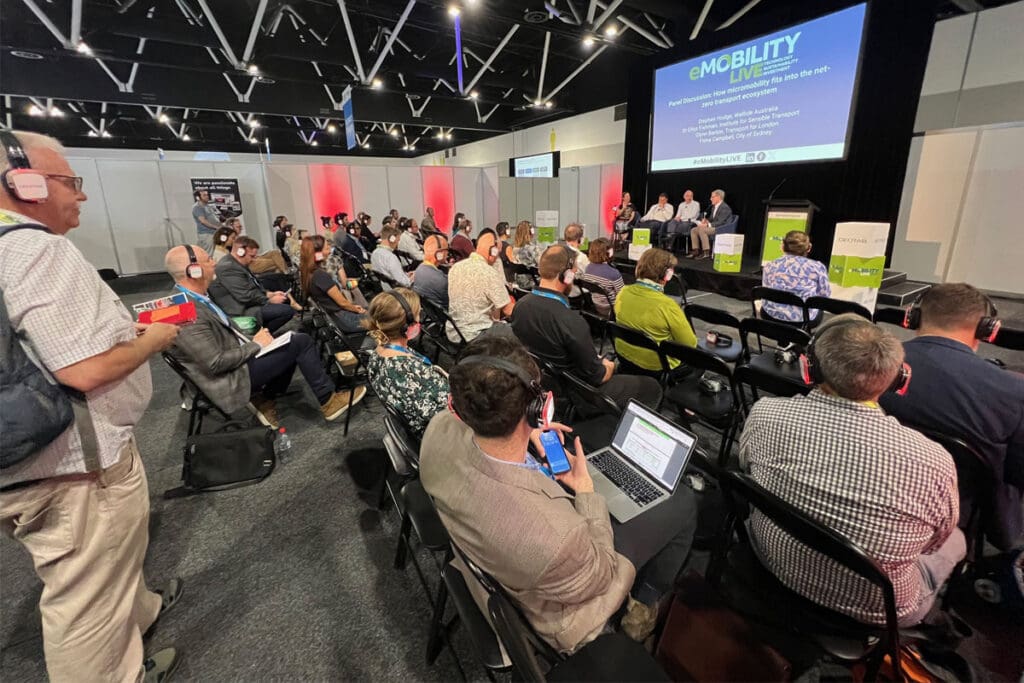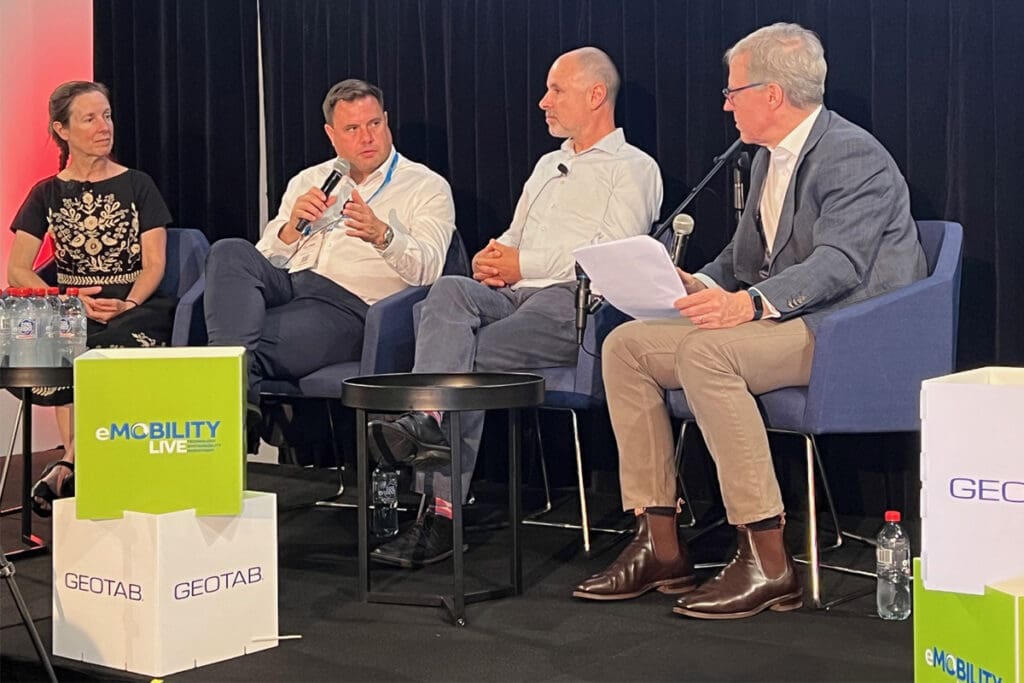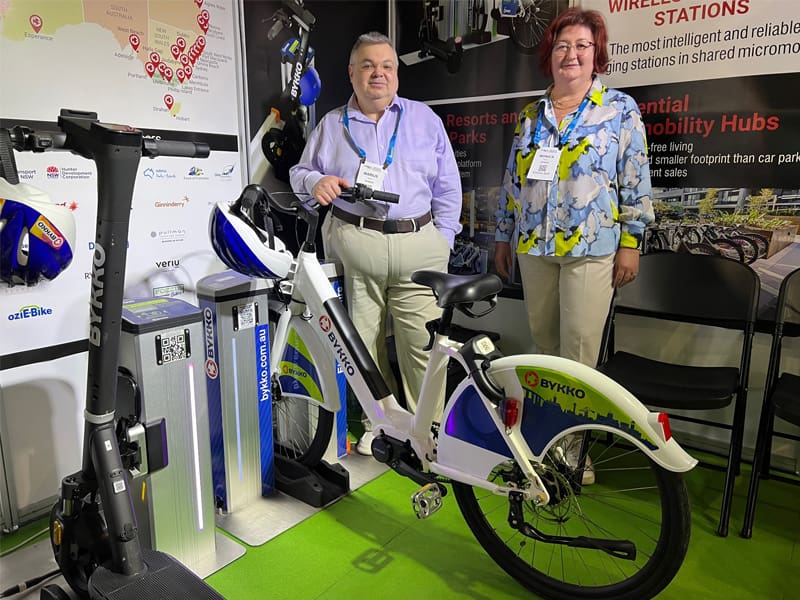Important Micromobility Elements at New Look Expo

Darling Harbour, NSW
The National Roads and Traffic Expo has been a relatively small expo in past years, with a very tight focus on road building and related infrastructure and services.
However, its format was expanded and electrified for 2023 when its organiser Terrapinn Events, a large global events company, added eMobility Live to the line-up.
This added a range of exhibitors including electric car manufacturers, EV charging stations, and, of most importance to us, micromobility.
Exhibitors from the micromobility sector included Airbike, Benzina Zero, Bykko, Ride Electric, Cyberbikes, Kidvelo, Parcelrun, Smart Motion Bikes and Revolve Recycling.
Other more general exhibitors also do significant business in the micromobility market, including Green Frog and Leadsun (path lighting), Artcraft (signage), Moddex (handrails) and Metro Count.
One of the conference theatres set up around the perimeter of the expo was themed ‘Micromobility & Last Mile Delivery’. I had the privilege of chairing this half-day event.

It kicked off with a panel discussion moderated by We Ride Australia’s Stephen Hodge, who was joined by City of Sydney’s cycling strategy manager, Fiona Campbell, Institute of Sensible Transport director Dr Elliott Fishman, and Transport for London (TfL) chief operating officer Glynn Barton.
It was great to hear the perspectives of all three. Glynn made the long journey from London to stay just three days in Australia. In his role at TfL, he oversees day-to-day management of all of TfL’s modes of transport, including London Underground, Bus, London Overground, Elizabeth Line, Tram, Docklands Light Rail, Strategic Roads, River Services, Cable Car and, of course most importantly, bike share, with well over 20,000 staff and an operating budget of approximately £6 billion (A$11.58 billion) per year.
It turned out he’s also a cycling fan and daily cycle commuter. He told the panel discussion that multiple catalysts need to align for micromobility to move forward dramatically, including research, investment, political will, lower speed limits on roads and the right information, including signage.
Meanwhile, as proof of the ‘build it and they will come’ concept, Fiona reported that the proportion of bicycle trips in Sydney’s urban renewal precinct of Green Square had increased significantly. She said the proportion of trips to work or university by bike had climbed to 15%, and the rate at nearby Ashmore was even higher at 19%. These are two densely populated, inner-city areas.
Elliot said all transport systems – road, rail, shipping and micromobility – all shared three key elements: terminal capacity, right of way and the vehicle. All three factors had to be considered to avoid bottlenecks or other problems.

The next session was presented by Dr Alexa Delbosc from Monash University and had the provocative title “Cockroaches on wheels? Putting a human face on cyclists.”
Alexa presented some very concerning research results, including quotes and images, that show how far we have to go before people riding bikes are considered to be just that – people. We hope to publish more of this presentation in future.
After lunch I moderated a panel session with Benzina Zero co-founder Ben Silver, Professor Stephen Greaves from the Institute of Transport and Logistics Studies at the University of Sydney and the founder and CEO of Parcelrun, Patrick Ibrahim. See our recent report on ParcelRun.
Stephen reported that his Institute is working on a cargo bike review.
Ben said one of the main barriers his company faces as an importer and distributor of light electric vehicles is there’s no uniform legislation across Australia. Regulations about who can ride their vehicles under what circumstances vary from State to State. He said all three levels of government – Local, State and Federal – currently have regulations that are a road block to micromobility.
Patrick reported that their three-month parcel delivery trial had launched the previous day. It was off to a smooth start and that they were delivering 500 parcels per day, with just six e-cargo bikes and riders. Each bike was able to replace the workload of a full-sized delivery van.
Bicycle NSW CEO Peter McLean presented the next session, about how Sydney could reduce traffic by two million car trips per day if people doing journeys of five kilometres or less used other modes of transportation such as cycling or walking.
Bicycle Industries Australia general manager Peter Bourke and EV Fire Safe representative Sara Mills finished the day with a discussion about battery fires and what needs to be done about this growing problem.
Sara said a new collection of global data reported there have been 44 deaths and 175 injuries around the world over the past 12 months due to light electric vehicle battery fires. This includes e-bikes and e-scooters – a sobering note to end the presentations in what was overall a promising first attempt to incorporate micromobility into this traditionally road-focused event.
Next year’s eMobility Live has already been announced for 30th-31st October, at the Melbourne Convention and Exhibition Centre.
